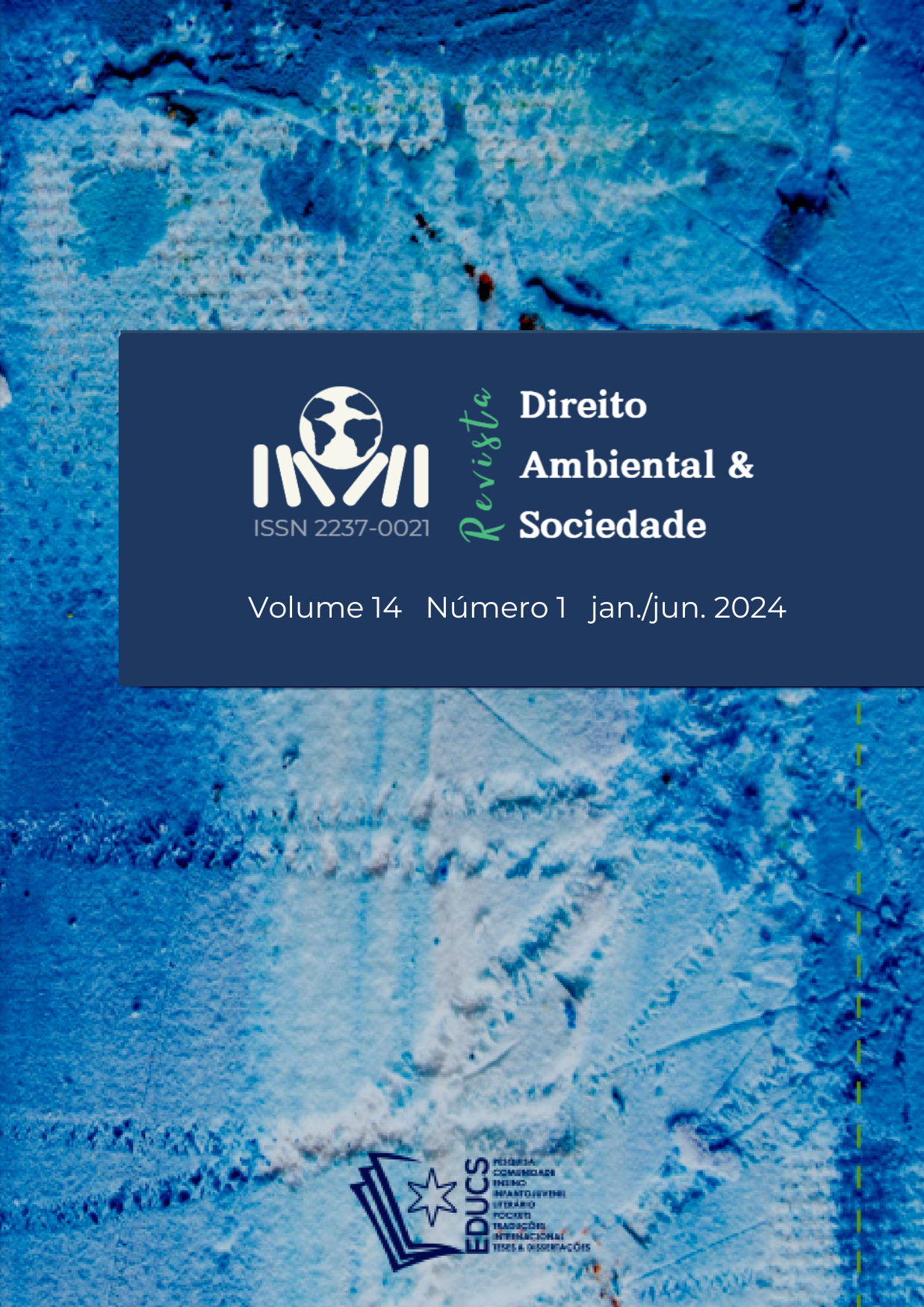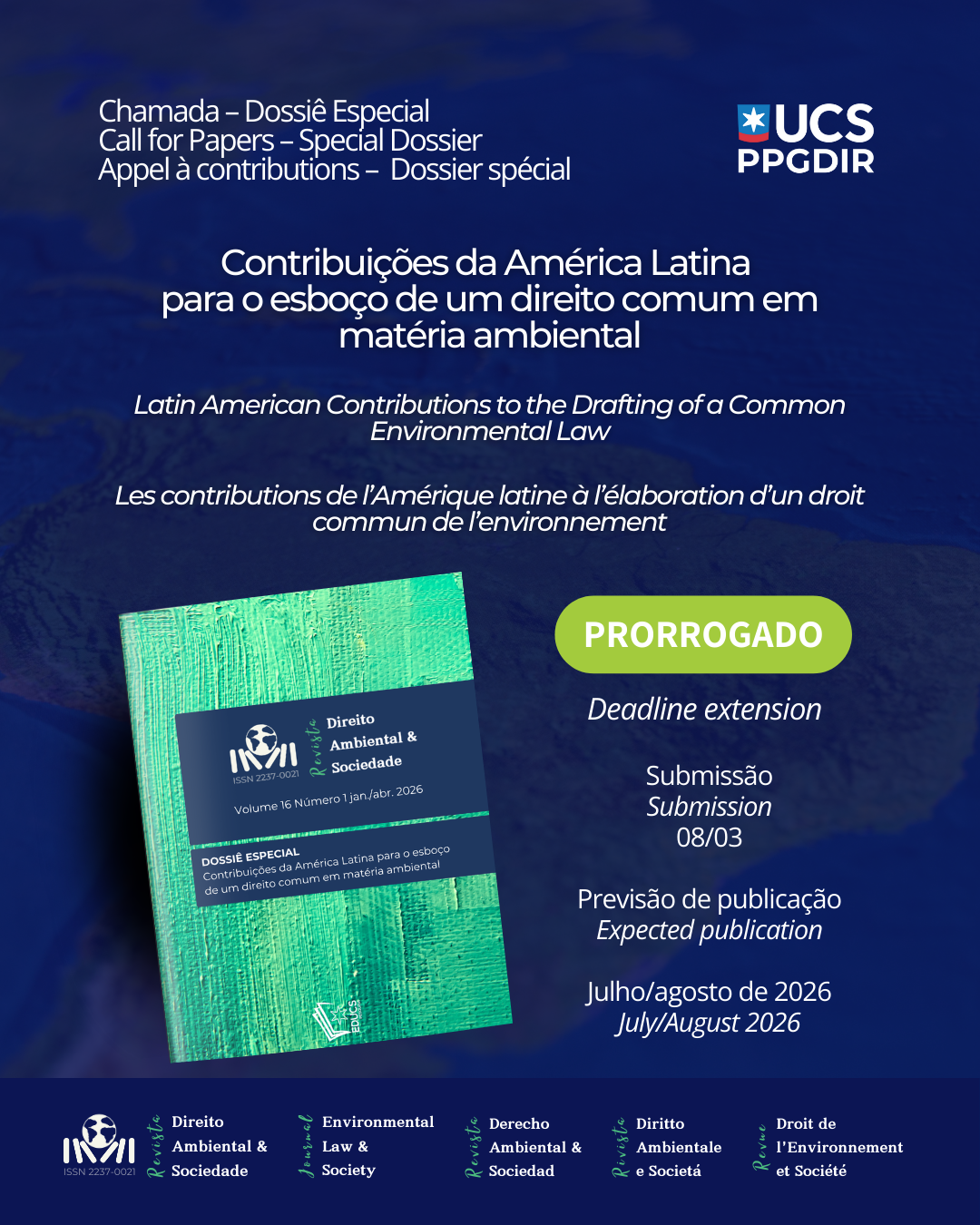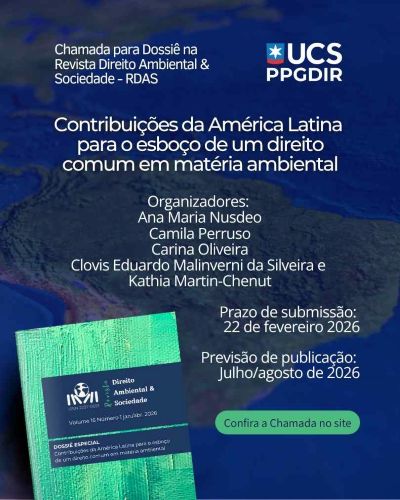Elementos para um Neoconstitucionalismo Ambiental
DOI:
https://doi.org/10.18226/22370021.v14.n1.18Palavras-chave:
Constituição Ambiental, Direitos Ambientais, Estado de Direito Ambiental, Justiça AmbientalResumo
Diante da afirmação de que as Constituições Políticas não exigem mudanças, modificações ou reformas e quanto mais tempo o texto constitucional permanecer inalterado, isso significará sua força e submissão ao passar do tempo, acreditamos que na contemporaneidade e por ocasião de grandes e graves transformações nas visões do mundo e da vida que causa danos, deterioração e poluição, são necessários avanços significativos no que diz respeito ao respeito irrestrito aos direitos e à proteção dos sujeitos, não apenas em um determinado Estado-nação, mas em todo o Planeta Terra. Os problemas e conflitos contemporâneos exigem a constitucionalização de uma série de novos direitos e a proteção de novos sujeitos, que responda às demandas de proteção material e efetiva contra graves impactos ambientais, que afetam não apenas alguns seres humanos em nível local, regional ou nacional, mas têm impacto a nível internacional, continental e global. Dado que as disposições ambientais nem sempre fizeram parte dos mandatos constitucionais, a normatização e os desenvolvimentos feitos pelos tribunais constitucionais podem contribuir para a proteção do ambiente e dos direitos ambientais, orientando novas formas e práticas jurídicas. Esta discussão tenta especificar as principais orientações ambientais que deveriam estar no padrão mais elevado, mas ao mesmo tempo, destacar o seu défice e, em particular, insistir nas regressões normativas que podem indicar que hoje o globo vive uma situação 'anti-establishment' estado de coisas 'ambiental' ou acinzentado e poluente devido ao número de normas, políticas e práticas extrativas e produtivas contrárias ao necessário mandato de proteção do meio ambiente e dos direitos ambientais. Este artigo é composto por três componentes, que se referem, em primeiro lugar, à necessidade de incorporação explícita dos direitos ambientais nos textos constitucionais; Em segundo lugar, para superar as insuficiências associadas à proteção dos ecossistemas em benefício dos seres humanos que formularam as constituições 'ecológicas', é necessária a transição para um contrato ambiental e; a terceira, alguns elementos centrais do que poderia ser e conter uma Constituição Ambiental e uma forma de Estado que pudesse responder a tais desafios, a partir da proposta dos direitos ambientais como horizonte de sentido constitucional para tempos de grave crise.
Downloads
Referências
Bolivia, Asamblea Nacional Constituyente (2009) Constitución del Estado Plurinacional de Bolivia. La Paz. https://www.oas.org/dil/esp/constitucion_bolivia.pdf
Bolivia. Congreso. Ley de Derechos de la Madre Tierra, Ley Nº 071 de 21 de diciembre de 2010. La Paz. http://www.planificacion.gob.bo/uploads/marco-legal/Ley%20N%C2%B0%20071%20DERECHOS%20DE%20LA%20MADRE%20TIERRA.pdf
Colombia, Asamblea Nacional Constituyente (1991) Constitución Política 1991. Bogotá.
Colombia, Corte Constitucional (1992) Sentencia T- 411 de 1992, derecho al ambiente sano como derecho fundamental. MP Alejandro Martínez Caballero. https://www.corteconstitucional.gov.co/relatoria/1992/T-411-92.htm
Colombia, Corte Constitucional (1998) Sentencia C- 126 de 1998, Constitución Ecológica. MP Alejandro Martínez Caballero.
Colombia, Corte Constitucional (2002) Sentencia C- 339 de 2002, carácter ecológico de la Constitución Política. MP Jaime Araujo Rentería. https://www.corteconstitucional.gov.co/RELATORIA/2002/C-339-02.htm
Colombia, Corte Constitucional (2004) Sentencia T-774/2004, protección ambiental y eficacia normativa. MP: Manuel José Cepeda Espinosa. https://www.corteconstitucional.gov.co/RELATORIA/2004/T-774-04.htm
Colombia, Corte Constitucional de Colombia (2010) Sentencia C-228 de 2010, Constitución Económica. MP: Sala Plena. https://www.corteconstitucional.gov.co/relatoria/2010/c-228-10.htm
Colombia, Corte Constitucional de Colombia (2016) Sentencia T-622 de 2016, Río Atrato sujeto de derechos. Bogotá. https://www.corteconstitucional.gov.co/relatoria/2016/t-622-16.htm
Colombia, Tribunal Administrativo de Boyacá (2018) Sentencia de 9 de agosto
de 2018, Páramo de Pisba sujeto de derechos. Tunja. https://www.ramajudicial.gov.co/web/secretaria-tribunal-administrativo-de-boyaca/-/tribunal-administrativo-de-boyaca-declaro-que-el-paramo-de-pisba-es-sujeto-de-derecho
Ecuador, Asamblea Nacional Constituyente (2008) Constitución Política del Ecuador. Quito. www.asambleanacional.gov.ec/documentos/constitucion_de_bolsillo.pdf
Escobar, Arturo (2014) “Commons in the Pluriverse”. In: Bollier, David & Helfrich, Silke (eds.) Patterns of Commoning. Amherst: Off the Common Books.
Haberle, Peter (1997) La libertad fundamental en el Estado constitucional. Lima: Pontificia Universidad Católica del Perú.
Le Club des Juristes (2017) Pacte Mondial Pour L´Environnement. París. https://www.leclubdesjuristes.com/wp-content/uploads/2017/05/Pacte-mondial-pour-lenvironnement-24-juin-2017.pdf
Marquardt, B. (ed.) (2009) El bicentenario del constitucionalismo moderno en Colombia: documentos del primer siglo. Bogotá: Universidad Nacional de Colombia, Facultad de Derecho, Ciencias Políticas y Sociales, Unijus.
Mesa Cuadros, Gregorio (2020) “Derechos Ambientales como nueva teoría integral de los Derechos”. En: Anais de Artigos completos do IV CIDH Coimbra 2019 Volume 1, pp. 53-64. https://1d377ddc-c8c5-41f0-a5fd-b32d17ff3e72.filesusr.com/ugd/8f3de9_a429c79395f342bbbade32f7eff2188a.pdf
Mesa Cuadros, G. (2019) Derechos ambientales en perspectiva de integralidad: concepto y fundamentación de nuevas demandas y resistencias actuales hacia el Estado Ambiental de Derecho. 4.ed. Bogotá: Universidad Nacional de
Colombia, Facultad de Derecho, Ciencias Políticas y Sociales, Unijus. 1ª edición es de 2007, 2ª en 2010 y 3ª en 2013.
Mesa Cuadros, G. (2019a) “Environmental Rights, Responsibility and Care: a new constitutional paradigm”. In: Jaria-Manzano, J & Borrás, S. (eds.) Research Handbook on Global Climate Constitutionalism. Cheltenham, UK – Northampton, MA: Edward Elgar Publishing, pp. 176-194.
Mesa Cuadros, Gregorio (2019b) “Los ríos como sujetos de derechos: análisis de derecho comparado casos Río Atrato, Whanganui, Vilcabamba, Ganges y Yamuna”. En: Estándar Ambiental y Derechos Ambientales en postacuerdos de paz: algunos estudios de caso. Bogotá: Universidad Nacional de Colombia, Unijus, pp. 25-52.
Mesa Cuadros, G. (2010) “¡Quince años no es nada! Historia actual de la política y la legislación ambiental en Colombia” En: Toro Pérez, Catalina y Marquardt, Bernd (2010) Quince años de la política ambiental en Colombia. Bogotá: Universidad Nacional de Colombia, Unijus, pp. 5-14.
Mesa Cuadros, Gregorio (2001) Ambiente y derechos: tendencias actuales en ética, política y derechos ambientales. Universidad Carlos III de Madrid, Tesina de doctorado.
Naciones Unidas (1948) Declaración Universal de Derechos Humanos. Resolución 217ª (III) https://www.un.org/es/universal-declaration-human-rights/
Rodríguez Becerra, M. (2010). ¿Hacer más verde el Estado colombiano? En C.
Toro Pérez, & M. Bernd., Quince años de la política ambiental en Colombia (págs. 15-36). Bogotá: Universidad Nacional de Colombia, Unijus, pp.
Rodríguez Becerra, M. (2003) La reforma de la institucionalidad ambiental de Colombia doce años después. En: Economía Colombiana, Revista de la Contraloría General de la República, Bogotá, julio-agosto, Edición 297, pp. 36-47.
Rousseau, J.J. (1762) El contrato social; o los principios del derecho político. Amsterdam: Marc Michel Rey.
Serres, Michel (1991) El contrato natural. Valencia: Pre-textos.
Downloads
Publicado
Como Citar
Edição
Seção
Licença
Copyright (c) 2024 Revista Direito Ambiental e Sociedade

Este trabalho está licenciado sob uma licença Creative Commons Attribution 4.0 International License.
Você tem o direito de:
Compartilhar — copiar e redistribuir o material em qualquer suporte ou formato para qualquer fim, mesmo que comercial.
Adaptar — remixar, transformar, e criar a partir do material para qualquer fim, mesmo que comercial.
O licenciante não pode revogar estes direitos desde que você respeite os termos da licença.
De acordo com os termos seguintes:
Atribuição — Você deve dar o crédito apropriado , prover um link para a licença e indicar se mudanças foram feitas . Você deve fazê-lo em qualquer circunstância razoável, mas de nenhuma maneira que sugira que o licenciante apoia você ou o seu uso.
Sem restrições adicionais — Você não pode aplicar termos jurídicos ou medidas de caráter tecnológico que restrinjam legalmente outros de fazerem algo que a licença permita.
Avisos:
Você não tem de cumprir com os termos da licença relativamente a elementos do material que estejam no domínio público ou cuja utilização seja permitida por uma exceção ou limitação que seja aplicável.
Não são dadas quaisquer garantias. A licença pode não lhe dar todas as autorizações necessárias para o uso pretendido. Por exemplo, outros direitos, tais como direitos de imagem, de privacidade ou direitos morais , podem limitar o uso do material.















